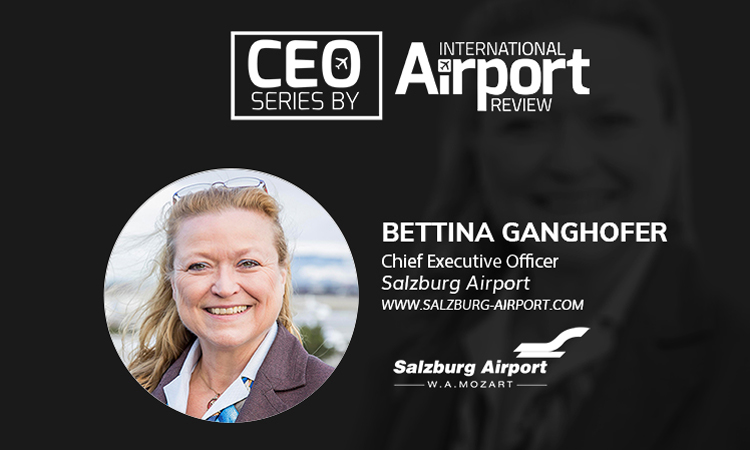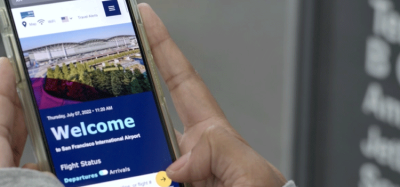CEO of Salzburg Airport hopes to be flying differently in the future
- Like
- Digg
- Del
- Tumblr
- VKontakte
- Buffer
- Love This
- Odnoklassniki
- Meneame
- Blogger
- Amazon
- Yahoo Mail
- Gmail
- AOL
- Newsvine
- HackerNews
- Evernote
- MySpace
- Mail.ru
- Viadeo
- Line
- Comments
- Yummly
- SMS
- Viber
- Telegram
- Subscribe
- Skype
- Facebook Messenger
- Kakao
- LiveJournal
- Yammer
- Edgar
- Fintel
- Mix
- Instapaper
- Copy Link
Posted: 6 March 2020 | International Airport Review | No comments yet
As part of International Airport Review’s exclusive CEO series, Bettina Ganghofer discusses how the future of aviation needs to become more sustainable in order to continue future growth.


How did your career in the aviation industry begin?
It began before my career started. My father was a pilot and, from day one, aviation was a part of my life. His love for the aviation industry became my love as well. Unlike my dad, it was not the aircraft that I found fascinating, but the processing of passengers, bags and cargo, the airports and the airlines themselves.
To learn how to plan and manage these processes, I completed a three-year vocational training programme with Lufthansa. This was a key experience to discover how much work and knowledge was involved in getting the system going. I gained a lot of knowledge, put in a lot of work, and never regretted it. Over many years, I have worked in different positions, and abroad, which has given me new and additional perspectives; enhancing my overall aviation experience tremendously.
What is the most rewarding aspect of being an airport CEO? On the other hand, what is most difficult?
The most difficult and the most rewarding aspect of being an airport CEO is the huge diversity of topics, challenges, problems, internal and external demands and the many different stakeholders.
Airports are predominantly service providers – satisfying customer needs is a key success factor. Furthermore, airports carry a lot of responsibility: Ensuring safety and security, respecting neighbours and the environment, being a landlord, managing all kinds of processes (both airside and landside), being part of the region and working for the benefit of the region. Having good people who work with you is a prerequisite and another one of the key success factors. The variety of different jobs is amazing – I am lucky and proud to have great teams at Salzburg Airport to handle all of this.
Can you give us an overview of the three most exciting developments currently happening at Salzburg Airport?
In 2019, we had to close down the airport for five weeks to renew our runway. We did this in time and within the estimated budget, although the weather – including snow and heavy rainfall – was not playing along. Logistics, innovative technologies and processes, as well as sound planning, were good bases, but the performance of the whole team was incredible.
Our flight programme is developing nicely at the moment, thanks to Eurowings increasing their base by another two aircraft, and new routes established by other airlines, like Nis, Tel Aviv and, starting in summer 2020, Helsinki.
Finally, our environmental efforts are picking up speed. Almost 40 per cent of our vehicle fleet runs on electricity, including an electric high loader. We are constantly changing from conventional to LED lighting, using solar energy, paying attention to our biodiversity (insects and plants), focusing on noise reduction and improving air quality.
What is the biggest challenge Salzburg Airport is having to tackle?
The biggest challenge? The modernisation of Salzburg’s main passenger terminal.
Currently, it is not one building, but consists of 16 buildings, dating back to the 1960s. The conglomerate of buildings is neither modern nor flexible, and does not offer enough space for current passenger flow. It is safe, but it is not meeting modern safety standards. It does not allow additional areas for retail and gastronomy, and it will not be able to cope with new regulations like EES (Entry Exit System) due to the lack of floor space. It is a daily headache. Any change or enhancement is extremely costly. Whatever we decide to do at Salzburg, we have to be able to finance it. Therefore, we have to clever and creative. We have to anticipate future passenger processes, flows and other possible demands. It is a demanding project, but extraordinarily exciting at the same time.
At this moment in time, what do you see as the biggest disruptor to the aviation industry?
We are facing an increasingly tough price and market share competition in the European aviation market. Many airlines have already declared, or are on the brink of declaring, insolvency. This development leads to increased consolidation and aggressive market approaches, a trend that – in my opinion – is going to continue. This will increase the pressure, especially on small and regional airports.
Alongside this, the demand for new technologies is high – fuel efficient aircraft and low-noise planes, as well as alternative fuelling, in addition to the envisioned single European sky. To create and implement affordable ‘green’ fuelling would be a disruptor, but in a very positive way. If we do not achieve this – shame on us.
Our working world is changing drastically. There is a significant increase in automated processes, which will make some jobs, as we know them today, redundant. It will impact the way we work and live. It is also a great chance, as we will need to generate different jobs. What those jobs will look like, what kind of training and know-how will be needed and how we prepare for this new job environment, are certainly key questions.
In your opinion, how does the aviation industry need to adapt to secure its place in the future?
The industry has accepted its responsibility about environmental needs. The industry has respective goals in place, be it the manufacturer, the airlines or the airports. As in every industry, it will take a combined effort, including governmental endeavours.
New technologies have to be researched and implemented. For the transition period, we need to work hard on the small steps, from biodiversity to e-technology, low emission aircraft and so on. In Salzburg, we see some of our airline partners increasingly using the Airbus Neo, which produces notably less noise in comparison to other aircraft. I believe that this sends out the right message, but much more needs to be done. All this will cost money, which will automatically lead to a different and more sensible pricing policy, which will make flying more expensive, but should remain affordable. Together with the changing job environments and requirements, this industry will stay exciting.
What does the future of the aviation industry look like to you?
All surveys show that the aviation industry is a growing market, partly because globalisation is a fact and many parts of the worlds are still discovering air travel to explore the world. Mobility has become an essential factor in modern society.
I am convinced that people will continue to travel for all kinds of reasons: To explore, to visit and to do business. Travelling is a bonding experience, it brings people together. Air traffic, as part of the transport chain, plays an essential role, especially when it comes to long distances. I am quite certain that we will not fly less in the future, but, hopefully, differently. I think it is mandatory and worth all the effort to be travelling in modern and climate-efficient aircraft, using less fossil fuels or emission-free fuels. The sky is our limit.
Bettina Ganghofer has been the Managing Director (CEO) of Salzburg Airport since 16 October 2017. Before she took the position in Salzburg, she worked in different positions in the Mitteldeutsche Flughafen AG, working for the Mitteldeutsche Flughafen GmbH for eight years. During this period of time, Ganghofer was the Managing Director of PortGround GmbH, then appointed as CEO of Dresden Airport and, finally, became Representative of the Board of Management for Cargo and Logistics for the entire business group. Prior to joining the Mitteldeutsche Flughafen AG, Ganghofer was working on the Management Board of Shanghai International Airport Cargo Terminal Co., Ltd (PACTL).
If you are a Chief Executive Officer, General Manager or Director of an airport and would be interested in participating in this series, please contact Leah Hockley, Junior Editor of International Airport Review.
Related topics
Airport construction and design, CEO series, Emissions, New technologies, Passenger experience and seamless travel, Safety, Security, Sustainability, Sustainable development, Winter operations


















